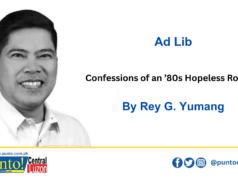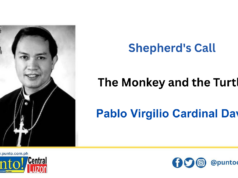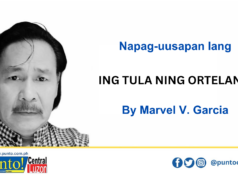When a big fish swims in an ocean, it creates waves that, in turn, produce ripples and currents, carrying off small fries every which way. It sheer size causes this to happen, perhaps without intending to, as result of its natural movement in the vast and free habitat.
The late Ambassador Eduardo “Danding” Cojuangco was a big fish in his time, no doubt much bigger than most fishes around the biggest fish of them all, the late strongman Ferdinand E. Marcos. But he was apparently less flamboyant, more taciturn and rarely seen in public events than most of his contemporaries, especially the non-biodegradable Juan Ponce Enrile.
He was the typical man who spoke softly but carried a big stick, or so that was the personality sketch figured out by those who didn’t have the privilege to see him up close and personal.
I came to know who he was sometime in 1972. I was then staying with a trusted aide of the late Ninoy Aquino. He was already in jail at the time, on Marcos’ order, despite earlier repeated assurances that it would not happen by then Defense Secretary Enrile.
Ninoy had asked this aide to take care of the senator’s displaced staff after his arrest, relayed from his jail cell. One day, I got a telegraph from the office of the late Bren Z. Guiao to report to Ninoy’s office. I was told later that Ninoy’s aide asked for me and he was willing to take me in his house so I could continue with my college studies without worrying about rent. He had also agreed with other Ninoy friends that they would take care of my other financial needs.
I slept in this person’s servants’ quarter. One night, there was some feeling of restiveness in the house, a sense of agitation. When I asked what it was all about, I was told Ninoy’s aide received an invitation to the dreaded military commission headed by a certain Col. Juan Sison. The military commisssion, which tried and sentenced Ninoy Aquino to death, was likened to the Inquisition during the Middle Age. (Today, the proposed council in the anti-terror bill being opposed widely is compared to this military commission).
There were only two things in the aide’s mind, neither of which he was ready and willing to experience: being arrested or detained. Early the next morning, unusual for a man who would wake up late, the aide drove to Pangasinan. He would see a very influential person who could be his only savior from his impending tragic fate. That man was Danding Cojuangco.
The aide came back home with Danding’s assurance. More, he would later become one of Danding’s top executives in the Northern Cement company.
When Ninoy got wind of his aide’s decision, he told his secretary to tell the aide that as soon as Ninoy comes back from the United States, “dapat magbalot-balot na siya.” I think it wasn’t about Danding per se, but the symbolism that his aide as defected to the Marcos camp, Ninoy’s nemesis or vice versa.
It wasn’t to be, as we know from history on August 21, 1983.
In 1975, Danding’s name was the centerpiece of our corporate conversation after he offered to sell a bank to my employer, the Philippine Coconut Producers Federation or COCOFED which was then awash in cash because of the coconut levy imposed on coconut products.
COCOFED had the money to acquire a bank for the lowly coconut farmers, all of a piece with helping the farmers improve their livelihood through less onerous financing means to run their small plantations.
Enrile brokered the deal, which actually was a done transaction that only needed to go through the usual formalities. The deal, of course, had Marcos’s imprimatur. (Who could say no Imelda, a COCOFED laywer once argued before the Supreme Court on the issue of COCOFED’s P20 million donation for the building of the Coconut Palace, Imelda’s project).
As part of the concession, the amount of 77,777 worth of shares of stocks shall be made in the name of Marcos. From this transaction, the United Coconut Planters Bank was born, rising from the defunct First United Bank. The other part of the concession was that Danding was to be awarded a Management Contract for five years. Voluminous shares of stocks were eventually distributed to coconut farmers nationwide, making them owners, for the first time in history, of a huge commercial bank that will serve them.
Sometime in early 1982, another round of stock distribution was scheduled, this time requiring the farmers to sign the proxy stubs assigning another five year management contract to Cojuangco.
In a subsequent meeting with Dangding’s lawyer, Atty. Joe Concepcion, or Joecon as he was informally called, Concepcion advised us that the farmers must sign the proxy stub or they don’t get certificates. He asked us if we had any questions. I raised my hand. He nodded in my direction.
I expressed my doubts about the idea. I said that I felt the transaction was lopsided in favor Danding if we didn’t give the stocks to the farmers who rightfully owned the the bank in the first place, because of their refusal to sign the stub. I said the farmers already paid for them.
Turning to the beautiful lady next to him, Atty. Concepcion said, loudly, that if there was anyone who should bring that up was my boss, Mrs. Maria Clara Lorenzo Lobregat, at the time COCOFED’s president, because I was a mere employee.
Hours after, I was summoned to the office of Mrs. Lobregat who gave me a rabid full-blown lecture about who Danding was. “Do you think Mr. Cojuangco is a thief? Do you know that he is a millionaire many times over? Do you know that his mother was a Murphy? And other non sequiturs.
The next day, I learned that my name was deleted from the list of those authorized to travel across the country to handover the stocks to farmers. Mrs. Lobregat maintained that if I could not convince myself on the moral premise of a proxy stub, I could not convince the farmers to sign them.
It was slippery slope for me since then. Two years after, I decided to leave COCOFED.
Sometime in 2012 or 2013, Congressman Aurelio “Dong” Gonzales Jr didn’t have party to run under for his reelection bid. The Liberal Party already had the veteran politician and parliamentarian Oca Rodriguez. Dong asked me one night to accompany him to Quezon City where was to meet with stalwarts of a national party.
We ended up in the house of, you guess, Danding, in New Manila. Danding wasn’t there. There were the leaders of the Nationalist Party Coalition or (NPC) headed Frisco San Juan and Dy of Isabela on hand.
After the meeting, Dong exuded confidence that he was to be made the leader of the party in his district or the province. Apparently, that didn’t materialize because powerful politicians in Pampanga who favored Oca over Dong were against it. Dong eventually lost his reelection.
Danding’s recent passage into another life has left no small vacuum in Philippine business and politics.
I have yet to come across a biography of him, most importantly the crucial role he played in our political, social and economic development as a nation, especially during Martial Law, and how he had made a difference.
That much he owes the nation as it moves forward with the perennially unsteady steps toward the future and avoid the kind of mistakes or pursue the right strategies to achieve the end that the everyday Filipino, especially the small fries, envisions.





